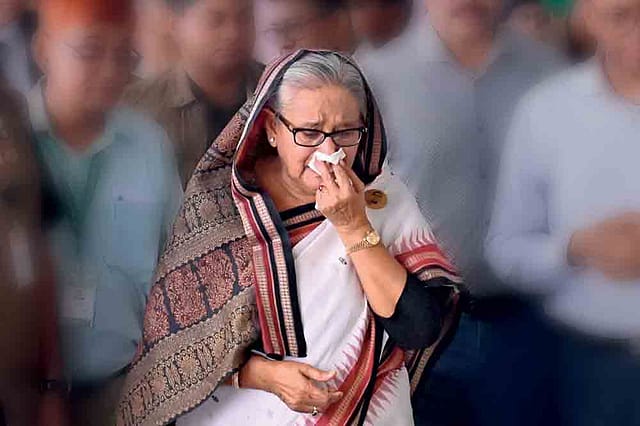Experts split on India’s next move as Sheikh Hasina faces death sentence

The death sentences awarded to ousted Bangladesh Prime Minister Sheikh Hasina, who is currently in India, by the so-called International Crimes Tribunal, which she had set up originally in 2010 to try war crimes committed during the 1971 liberation war, have attracted mixed responses from across the world, especially since it involves a violent crackdown on student protests on her watch.
Faisal Devji, professor of Indian history at Oxford, says that while the new Bangladeshi government's efforts to try Sheikh Hasina for crimes against its citizens may be unobjectionable, sentencing her to death in absentia raises doubts about the democratic credentials of the new administration. Hasina, the longest-serving Bangladeshi prime minister since the country's independence and the longest-serving female head of government in the world, fled to New Delhi on August 5, 2024, even as Nobel Peace Prize laureate Muhammad Yunus took over as interim leader of the country.
Devji adds, “It may be that like the proposal to try Hasina, her sentencing is also a symbolic gesture, since it is highly unlikely that India will return the former prime minister to Bangladesh. But even so, it does damage to the government's reputation, not least as it remains an unelected and interim one. Comparisons will inevitably be made to Sheikh Hasina's own war crimes tribunal, set up to try those supporting Pakistan during the country's violent founding in 1971, that was seen internationally as being deeply compromised. If anything, such gestures as sentencing Hasina to death simply continue the ex-prime minister's own legacy and undermine Bangladesh's claim to a new beginning.”
Modi Rearms the Party: 2029 On His Mind
23 Jan 2026 - Vol 04 | Issue 55
Trump controls the future | An unequal fight against pollution
Bangladesh's International Crimes Tribunal found Hasina guilty on three charges: incitement, order to kill and inaction to prevent the atrocities.
The Muhammad Yunus-led interim government has urged India to extradite Hasina and her co-accused and Bangladesh's former home minister Asaduzzaman Khan Kamal, after the two were sentenced early this week to death for their role during the protests in Bangladesh last year.
Meanwhile, reacting to the death sentence to Hasina over “crimes against humanity”, China said it was Dhaka's “internal affair”. New Delhi, for its part, said, “India has noted the verdict announced by the ‘International Crimes Tribunal of Bangladesh’ concerning former Prime Minister Sheikh Hasina. As a close neighbour, India remains committed to the best interests of the people of Bangladesh, including in peace, democracy, inclusion and stability in that country.”
Interestingly, Sudeep Chakravarti, a longtime analyst of South Asian dynamics and policy, a columnist, author, and educator, argues that the death sentence awarded in absentia to Sheikh Hasina by default plays to an understandable public emotion but not complete judicial due process.
Chakravarti, who until late-2024 taught at a liberal arts university in Dhaka and observed the violence in Bangladesh first-hand, went on, “That Hasina was squarely in command during the anti-quota students’ protest over July and August 2024 is not in doubt, and neither is her culpability for the deaths, injuries, torture, disappearances and arrests of several thousand people—including the death of several children. The irony is that the same imperfect due process she used through the ICT that her government established to judge and execute those accused of killing her family members and commit genocide in Bangladesh, is the one used to bring her to justice.”
“To me this judgment was a foregone conclusion,” he avers, emphasising, “I was in Bangladesh from early 2022 to late 2024 and saw the grand corruption, absolutism, and the violence that Hasina and her government visited on the country. The violent government pushback in July and August 2024 crossed even that limit. For all her development initiatives she had become the Ceaușescu of South Asia.”
Chakravarti offers a different emphasis, suggesting her death sentence may not substantially undermine Bangladesh’s claims of a new beginning. “That new beginning irrevocably happened with her exit on 5th August 2024. And that new beginning, whether Hasina or those who provide her shelter in India like the outcomes or not, will be reinforced by Bangladeshis who will elect a new government in February-March 2026.”
He states that what is disappointing though is Muhammad Yunus’s triumphalist comments after Hasina was awarded the death sentence. “Any head of government should remain above pettiness--and certainly of the sort that Hasina was squarely accused of. India’s game in Bangladesh was remarkably obtuse and flat-footed as I have often written and remarked. With Hasina’s exit and the meltdown in India-Bangladesh relations, the gainers are every regional power inimical to India, as well as some of India’s so-called friends.” India would do well to let Hasina slide instead of using her to bait post-Hasina governments of Bangladesh, and work with the government and people of Bangladesh to mend ties and walk back India’s awful optics in that country, Chakravarti says.
Indian and Bangladeshi officials have been in parleys ever since the death sentence was awarded to Hasina, leader of the Awami League and daughter of the late Sheikh Mujibur Rahman, Bangladesh's founding president. A Dhaka-based academic told Open on condition of anonymity that he wouldn’t make any comments – “such as death of democracy in Bangladesh” – because Hasina’s party had done to her political rivals the same her rivals are now doing to her party now. “It has been the case for a long time now,” he notes, adding that people are far more deeply polarised along political lines than ever before in the recent past in his country.”
